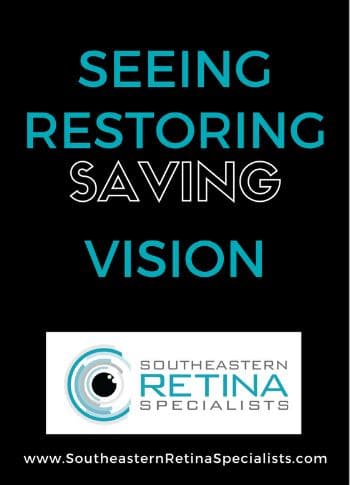What is RVO?
Retinal vein occlusion (RVO) is a serious eye condition that can cause blurred vision or even a loss of eyesight in part of, or the entire eye. In fact, it’s one of the most common reasons why people lose vision worldwide and should be treated by a board-certified retina specialists, such as Dr. Shawn Agee and Dr. John Sullivan in Jacksonville, FL. The condition is caused by a blockage occurring in the small veins of the eye. These veins carry blood away from the retina, which is an important layer of tissue that is located in the back of the inner eye. The retina is responsible for converting light images to nerve signals and then sending those signals to the brain. A blockage in any of the veins of the retina are often a result of the hardening or thickening of the arteries in the retina. Even though RVO is a very serious disorder, it can be treated at Southeastern Retina Specialists and vision can often be successfully restored.
Causes and Symptoms
There can be several causes of RVO, but the primary cause is due to a blockage that occurs within the veins of the retina. The blockage can be because the arteries have hardened, which is known as atherosclerosis, which can lead to a blood clot. In one particular form of the disorder, called branch retinal vein occlusion, there’s a blockage in the retina’s veins due to a hardening or thickening of the veins. These hardened veins cross over one another and put pressure on the retinal vein, which causes the condition. Further, patients with diabetes, high blood pressure, atherosclerosis, and other eye conditions such as macular edema or glaucoma have a better chance of developing RVO.
The most common symptoms of retinal vein occlusion are experiencing a sudden blurring in the vision or experiencing vision loss in either part of the eye or the entire eye.
Diagnosis
There are numerous tests available to diagnose RVO. They include:
- Visual Examination – A visual field examination is a testing of the patient’s side vision.
- Dilation – This is a test that is performed after the pupil is dilated, which allows the retina to be examined.
- Pupil Reflex Response – This test checks the diameter of the pupil by exposing it to varying degrees of light.
- Visual Acuity – Vision test to determine the smallest letters one can read on an eye chart or video monitor.
- Refraction – Eye chart test to test vision.
- Slit lamp examination – This is a test microscope with high-intensity light that looks at various structures in the front of the eye.
- Retinal Photography – An exam where pictures are taken of the eye to get an up-close look at the retina.
- Fluorescein Angiography – An exam where a fluorescent dye is injected into the bloodstream to move into the blood vessels in the back of the eye as pictures are taken to get a better view of the retina.
- Fluid Pressure – Also known as intraocular pressure, fluid pressure in the eye is measured with a tonometer.
Treatment and Prognosis
RVO is caused by a blockage, but there’s no way to open or reverse that blockage. There are treatment options that you can discuss with your doctor to prevent another blockage from occurring, though. Since chronic conditions like high blood pressure, high cholesterol, and diabetes can lead to RVO, it’s critical to manage these diseases by taking all prescribed medications, visiting a doctor regularly, and living a healthy lifestyle. In some cases, taking aspirin or blood thinners can help treat RVO.
There are several ways to treat the complications caused by RVO. When macular edema (a build-up of fluid in the central part of the retina) is present, focal laser treatment can be used to treat the condition. Laser treatment can be used to prevent glaucoma by preventing the growth of abnormal blood vessels. A doctor can also inject a drug into the eye to prevent the growth of additional blood vessels that can lead to glaucoma. However, this treatment is still undergoing study.
While some patients will regain some vision without treatment, it’s important to seek medical assistance when encountering vision problems.
Treat RVO
Retinal vein occlusion needs to be diagnosed early to restore any vision loss. Our practice is equipped to diagnose and treat RVO with a number of treatments to provide you with the best prognosis possible. Please give us a call to schedule your appointment as soon as possible.




